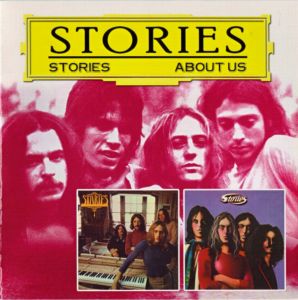
- Format: FLAC

Stories was always an odd creature, bearing echoes of Michael Brown's delicate work with Left Banke, a more mainstream McCartneyesque pop also reminiscent of a sweeter Raspberries and, thanks to Ian Lloyd's light rasp, hints of Rod Stewart. That hoarse soulfulness served Lloyd well on the band's only hit "Brother Louie" - which appeared on their second album, About Us -- but he was never a true blue-eyed soul vocalist, and not just because Stories didn't often delve into blues-rock: his touch was too light, his voice too high and thin to dig deep into R&B. He was stuck between two sounds, between precious pop and soulful rock, which was completely appropriate for Brown's artful pop writing. Brown's songs for Stories weren't immediate, they were elliptical and gentle, just melodic enough to hint that these tunes are hookier than they are, having just enough structure to suggest big pop arrangements that never quite materialize, at least on their debut Stories. The touchstone for Stories is quite plainly Paul McCartney, as this is music that places the melody at the forefront; it's proudly precious and willfully whimsical, music crying out for listeners with a sweet tooth. Here, Stories make Badfinger seem like muscular macho men, as their hardest-rocking song "Take Cover" - with its big, cascading chorus, it's a tune that could have slipped onto No Dice - almost perversely avoids power chords. Then again, "Take Cover," while it does point the way to About Us, is atypical on Stories, as its built upon baroque ballads and lovely, lilting mid-tempo pop, signatures of Michael Brown from the days of Left Banke. While it's interesting to hear Brown navigate the valleys of modern-rock production here, Stories could have used more definition in its arrangements, more power in its production, to really grab listeners. As it stands, its ideal music for cultists: music that requires a bit of work, but not too much, to truly appreciate, and it does pay back the effort it demands.
Compared to the band's intricate, insular debut, About Us is a completely different story altogether. No work is required of the listener on this second album by Stories, as Eddie Kramer's cinematic production gives the band definition and drama, pulling them into the leagues of such power poppers as Badfinger, the Raspberries, and Todd Rundgren. Not that Stories rocked as hard as any of those three -- there's not much kinetic thrust to their rhythms or reckless abandon to their playing, not even on the boogie "Don't Ever Let Me Down" or the jokey blues of "Down Time Blooze" -- but there's muscle and color to their sound on About Us; the songs leap out of the speakers and command attention, unlike the tunes on the debut which whispered and required close listening. Not that Michael Brown has abandoned his long-standing infatuation with delicate melodies, or even his fondness for McCartney-esque whimsy, but when put through the filter of Kramer's production, everything becomes bigger and bolder, to the extent that a jaunty piano instrumental, "Circles," recalls nothing so much as one of Billy Joel's ragtime tunes of the early '70s. Such moves toward the mainstream are undoubtedly why Brown bolted some time during the recording, leaving the band as the sole province of singer Ian Lloyd, but the music left behind is almost all unmistakably Brown's, as its all driven by melody and even occasionally built upon baroque keyboards. The major difference and inarguable improvement is the production, which fleshes out the songs, not only making them easier to appreciate but harder to resist, turning About Us into a minor power pop classic. Of course, the exception to the rule is the album's lone hit, a lush cover of Hot Chocolate's "Brother Louie" which suggested Stories were a blue-eyed soul AM pop band, a suggestion that the rest of the album proved unfounded, but fewer people heard the other 12 songs on this album, not just in 1973, but throughout the years, so About Us turned into a lost pop classic that even pop aficionados had to be persuaded to find. But once they were persuaded, they were often seduced by this sumptuous yet powerful pop album.